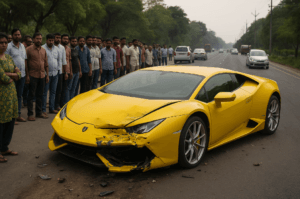Lamborghini Crash Sparks 7 Shocking Truths About India’s Broken Justice – Outrage & Privilege Exposed!
A recent Lamborghini crash in Noida, India, has reignited public anger over the country’s justice system and how it appears to protect the wealthy. Deepak Kumar, a luxury car dealer, hit two construction workers while test-driving a Lamborghini and was released on bail for just US$300. The car belonged to social media influencer Mridul Tiwari, adding to the public’s frustration over the role of privilege in legal outcomes. A video showing Kumar’s indifferent reaction at the scene went viral, fueling accusations of impunity for the rich.
This case echoes a similar 2024 incident in Pune, where a teenager driving a Porsche killed two people and received a lenient sentence. Experts blame poor driving skills, weak law enforcement, and a lack of accountability for the rising number of such crashes. Human rights lawyer Colin Gonsalves stressed that laws must be applied strictly, regardless of a driver’s wealth or age. Without stronger legal action, critics fear the cycle of inequality and injustice on India’s roads will only continue.

Lamborghini Crash Sparks 7 Shocking Truths About India’s Broken Justice – Outrage & Privilege Exposed!
A recent Lamborghini accident near New Delhi has reignited public anger in India over how the legal system often appears to favor the wealthy. The crash, which left two construction workers fighting for their lives, has drawn sharp criticism for highlighting the stark divide between the rich and poor in accessing justice. The incident occurred in Noida, a city bordering India’s capital, when Deepak Kumar, a luxury car dealer, lost control of a Lamborghini he was test-driving. The vehicle plowed into two workers before slamming into a road divider. Despite the severity of the collision, Kumar was granted bail the very next day for just ₹25,000 (approximately $300)—a decision that sparked outrage on social media and beyond.
A viral video from the crash scene added fuel to the fire. It showed Kumar stepping out of the mangled car and casually asking bystanders, “Did anyone die?” His indifferent tone, combined with the victims’ status as daily wage laborers, intensified public frustration. Many saw the incident as yet another example of India’s elite evading accountability due to their wealth and connections. The luxury car involved was reportedly owned by 24-year-old social media influencer Mridul Tiwari, who boasts millions of followers. Tiwari had handed over the vehicle to Kumar for a test drive ahead of a potential sale, further amplifying scrutiny over the privileged circles involved.
The case has drawn comparisons to a similar high-profile incident last year in Pune, where a 17-year-old driving a Porsche under the influence struck and killed two people. The teenager received what many deemed a shockingly lenient punishment: a 300-word essay on road safety, a brief period of counseling, and a requirement to assist traffic police for 15 days. The ruling sparked nationwide outrage, with critics accusing the judiciary of prioritizing the perpetrator’s affluent background over justice for the victims. Following the Noida crash, social media users sarcastically questioned whether Kumar, too, would be let off with a trivial penalty. “First Pune, now Noida—when will the rich learn?” wrote one user, reflecting widespread disillusionment.
India’s roads are among the most dangerous globally, with a staggering 10% of the world’s road fatalities occurring in the country despite it accounting for just 1% of vehicles. Government data reveals that speeding causes over half of all traffic deaths—a statistic experts link to a lethal mix of reckless driving, inadequate training, and the rising popularity of high-speed luxury cars. Hormazd Sorabjee, editor of Autocar India, emphasized that many drivers lack the skills to handle powerful vehicles like Lamborghinis, which can accelerate to dangerous speeds within seconds. “These cars demand expertise, but owners often treat them as status symbols rather than recognizing their risks,” he noted.
Human rights lawyer Colin Gonsalves highlighted systemic flaws in how such cases are handled. He argued that while crashes involving the wealthy frequently make headlines, media attention fades quickly—especially when victims are from marginalized backgrounds. Gonsalves also pointed to legal loopholes that enable the rich to manipulate outcomes, such as swapping drivers post-accident to avoid responsibility. “The cars change, but the victims are always the poor,” he stated, urging stricter penalties for reckless driving, including harsher punishments for minors. Current laws cap jail time for underage offenders at three years, a penalty Gonsalves called “grossly inadequate” for severe cases.
The recurring theme in these incidents—privileged individuals escaping meaningful consequences—has deepened public distrust in the justice system. Critics argue that until India enforces uniform accountability, regardless of wealth or status, such tragedies will persist. Gonsalves and other advocates stress the need for systemic reforms, including updated traffic laws and rigorous enforcement. Many believe only intervention by the Supreme Court, mandating equality before the law, can break the cycle of impunity. For now, the anger simmering after the Noida crash serves as a reminder of the urgent need for change in a society where the road to justice remains anything but equal.
You must be logged in to post a comment.